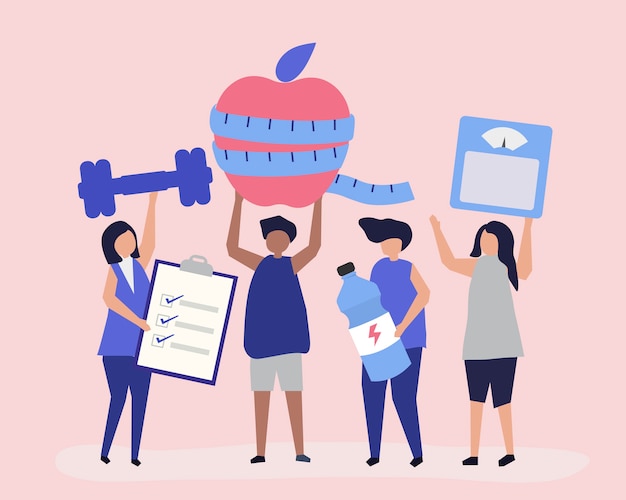
Exercise is often seen as the ultimate solution to weight loss, but the reality is far more nuanced. Moving your body is undeniably important for overall well-being, but the idea that you can simply “sweat off the pounds” is misleading. While exercise burns energy, true weight loss requires a holistic approach. Eating less and managing your nutritional intake in line with your body’s needs and caloric requirements is just as critical as physical activity. Sustained weight loss hinges on combining exercise with good dietary habits. In fact, evidence suggests that eating right plays a far bigger role in weight loss than exercise alone.
### Why Exercise Alone Doesn’t Guarantee Weight Loss
Many people believe that exercise is the primary driver of weight loss. Popular gym slogans and fitness programs often promote this idea, but scientific research paints a different picture. While exercise has numerous health benefits, such as improving cardiovascular function and reducing the risk of chronic diseases, it contributes only a small percentage to overall energy expenditure.
The energy your body uses can be broken down into three main components:
– **Basal Metabolic Rate (BMR):** This is the energy your body needs to maintain basic functions like breathing and circulating blood, even when you’re at rest. BMR accounts for 60-80% of your daily energy usage.
– **Food Digestion:** About 10% of your daily energy is spent on digesting food.
– **Physical Activity:** This includes all forms of movement, such as walking, standing, and exercising, but it only makes up around 10-30% of your energy expenditure. Exercise is just a small part of this category.
With exercise contributing such a limited percentage, relying solely on workouts to create a calorie deficit is a daunting task. For example, you’d need to run for miles to burn off the calories from just one slice of pizza. Without combining exercise with mindful eating, weight loss becomes significantly harder.
### Common Reasons Why Exercise Doesn’t Lead to Weight Loss
1. **Overestimating Calories Burned:** Many people believe they burn far more calories during exercise than they actually do. Unfortunately, even a moderately intense workout is often undone by a single indulgent snack.
2. **Increased Appetite:** Exercise can make you hungrier, leading to what’s called “caloric compensation,” where you eat back the calories you just burned. If your food intake isn’t adjusted accordingly, you may stall or even reverse your weight loss efforts.
3. **Self-Rewarding Behavior:** After a tough workout, it’s tempting to reward yourself with treats or large meals. This can easily cancel out the progress made during exercise.
4. **Sedentary Behavior Post-Workout:** Exercise can leave you feeling exhausted, reducing your non-workout activity levels for the rest of the day. This means you may burn fewer overall calories than you anticipated.
5. **Lack of Portion Control:** Portion sizes and nutritional quality matter just as much—if not more—than exercise. Without cutting back on high-calorie, low-nutrient foods like fried snacks and sugary beverages, weight loss becomes an uphill battle.
6. **Low Exercise Intensity:** Not all workouts are created equal. Low-intensity activities like walking may benefit overall health but are unlikely to lead to significant weight loss without dietary changes. High-intensity strength training and interval exercises tend to be more effective for fat loss.
7. **Plateauing Results:** Performing the same exercises over time can cause your body to adapt, leading to fewer calories burned during workouts. To see continued progress, you must challenge your body with new or more intense workouts.
### The Role Your Diet Plays
Weight loss is heavily influenced by your diet, with roughly 80% of success tied to what you eat. Processed foods, sugary drinks, and high-carb meals may fuel workouts but can also lead to insulin spikes and fat accumulation. Instead, consider a diet rich in protein, healthy fats, and whole foods. Portion control and avoiding “empty calories” like sodas and chips are crucial for success.
Even if you exercise regularly, poor dietary choices can sabotage your progress. For example, just a few diet bars or weight-loss shakes may contain hidden sugars or unhealthy ingredients that derail your health and fitness goals.
### Stress, Rest, and Metabolism
Exercise isn’t a cure-all, especially when stress levels are high. Chronic stress elevates cortisol, a hormone that can encourage fat storage, particularly around the midsection. Additionally, over-exercising without adequate recovery can lead to burnout, decreased activity levels, and a slowed metabolism. Short, intense workouts coupled with proper rest may be more effective for weight loss than long, drawn-out exercise sessions.
### Final Thoughts
Sustainable weight loss is about balance. Exercise alone won’t deliver results unless coupled with mindful eating, proper portions, and a focus on overall lifestyle changes. While becoming overweight might be easy, reversing it requires consistent effort, motivation, and discipline. Stay active, eat well, manage stress, and view food as a source of nourishment rather than a response to emotions. By making these changes, you’ll not only shed those extra pounds but also improve your overall health and well-being.